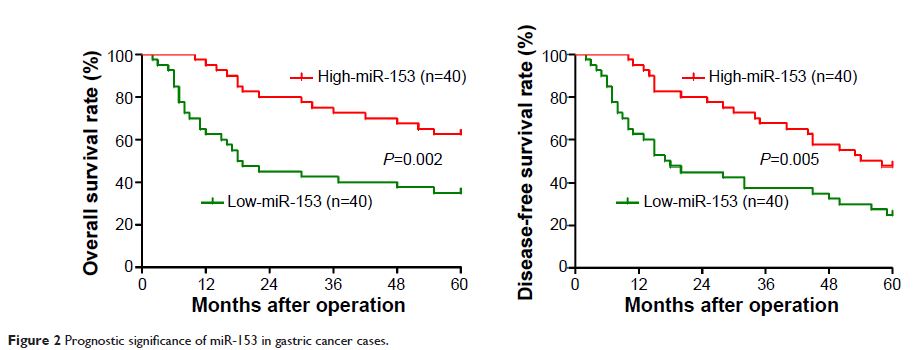109814
论文已发表
注册即可获取德孚的最新动态
IF 收录期刊
- 3.4 Breast Cancer (Dove Med Press)
- 3.2 Clin Epidemiol
- 2.6 Cancer Manag Res
- 2.9 Infect Drug Resist
- 3.7 Clin Interv Aging
- 5.1 Drug Des Dev Ther
- 3.1 Int J Chronic Obstr
- 6.6 Int J Nanomed
- 2.6 Int J Women's Health
- 2.9 Neuropsych Dis Treat
- 2.8 OncoTargets Ther
- 2.0 Patient Prefer Adher
- 2.2 Ther Clin Risk Manag
- 2.5 J Pain Res
- 3.0 Diabet Metab Synd Ob
- 3.2 Psychol Res Behav Ma
- 3.4 Nat Sci Sleep
- 1.8 Pharmgenomics Pers Med
- 2.0 Risk Manag Healthc Policy
- 4.1 J Inflamm Res
- 2.0 Int J Gen Med
- 3.4 J Hepatocell Carcinoma
- 3.0 J Asthma Allergy
- 2.2 Clin Cosmet Investig Dermatol
- 2.4 J Multidiscip Healthc

已发表论文
MicroRNA-153 作为胃癌预后指标及其在细胞迁移和侵袭过程中的作用
Authors Zhang Z, Sun J, Bai Z, Li H, He S, Chen R, Che X
Published Date February 2015 Volume 2015:8 Pages 357—364
DOI http://dx.doi.org/10.2147/OTT.S78236
Received 27 November 2014, Accepted 22 December 2014, Published 2 February 2015
Abstract: MicroRNA (miRNA)-153 (miR-153) has been considered as a novel
tumor-related miRNA and is found to be significantly deregulated in human
cancers. In this study, we found that the expression levels of miR-153 were
obviously lower in gastric cancer tissues than those in matched adjacent
nontumor tissues. Otherwise, miR-153 was expressed at significantly lower
levels in aggressive tumor tissues. Clinical association analysis indicated
that low expression of miR-153 was prominently correlated with poor prognostic
features in gastric cancer. Furthermore, we demonstrated that the low
expression of miR-153 was correlated with short 5-year survival of gastric
cancer patients. Multivariate Cox regression analysis indicated that miR-153
was an independent prognostic marker in gastric cancer. Our in vitro studies
showed that upregulation of miR-153 reduced cell migration and invasion in
MKN-45 cells. Meanwhile, downregulation of miR-153 promoted SGC-7901 cell
migration and invasion. An inverse correlation between miR-153 and SNAI1
expression was observed in gastric cancer tissues. In addition, upregulation of
miR-153 reduced SNAI1 expression and subsequently suppressed
epithelial–mesenchymal transition (EMT) with elevated expression of E-cadherin
and reduced expression of vimentin in MKN-45 cells. Furthermore, downregulation
of miR-153 increased SNAI1 expression and promoted EMT in SGC-7901 cells. In
conclusion, miR-153 is an independent prognostic marker for predicting survival
of gastric cancer patients and may promote gastric cancer cell migration and
invasion, by inhibiting SNAI1-induced EMT.
Keywords: miR-153, prognosis, SNAI1, EMT, tumor metastasis
Keywords: miR-153, prognosis, SNAI1, EMT, tumor metastasis
